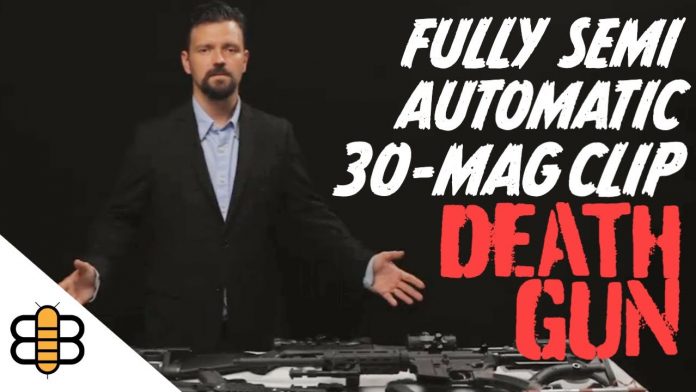
The Hill published an opinion piece from a GOP Pollster,
GOP pollster: Why bipartisan gun legislation should be the norm, not the exception
It’s an interesting insight into the perspectives of who I’ll title our ‘unaligned’ voices. People who are not actively hostile towards the 2nd Amendment, they just have a hard time mustering the energy to care. Their priorities are on different items.
That’s fine, but it is telling to see the perspective spoken aloud.
Over the course of nearly three decades, Congress followed a familiar pattern on guns. Send “thoughts and prayers” in reaction to the latest horrific mass shooting, take failed votes on a laundry list of gun safety bills, and get nothing done.
Which was the direct result of getting the wrong things done under the Clinton AWB, which didn’t prevent either of the most memorable school massacres in history. Columbine under the ban, and Virginia Tech just after the ban’s expiration, which was committed with weapons that were perfectly legal during the ban, conventional handguns.
So nothing done was a good thing, we’d already gone down some fundamentally stupid legal avenues to “fix” violent criminality… oh, I’m sorry, gun violence.
Until now.
Yep, time, atrophy, and circumstances meant it was politically damaging to maintain the thoughts and prayers mantra, so they tried the other version of thoughts and prayers with, “if it saves just one life, it is worth it.”
It’s the same thing, just one comes with legal penalties that don’t penalize the dangerous.
I am a long-time Republican pollster who has polled for elected GOP members who rarely support new gun laws. So, what went right this time so that lawmakers could finally come together and pass the Bipartisan Safer Communities Act?
They gutted it down to a swallowable amount of nothing burger, with a huge pile of money for school security.
The answer is simple: Democrats agreed not to make the perfect the enemy of the good, and Republicans heard from their own voters who wanted to see action.
By making it a swallowable enough nothing burger, mostly annoying with a few provisions that probably need legal challenges, and a giant pile of money for school security.
This may sound “Mr. Smith goes to Washington” corny coming from a pollster, but the fundamental role of a Member of the House or Senate is to represent the interests of the constituents who send them to D.C. And the truth is that Americans of all political stripes see an urgent need for gun safety reforms.
They just differ wildly on what those should be and on their various competencies to provide any constructive commentary on those reforms. Not all opinions are created equal. You’re allowed to have them, certainly, but how seriously we take them should be directly causative with how well it is backed as a well formed opinion via cross examination and critical thinking.
Politicos on both sides don’t like that, dumb rubes are easier.
In a recent survey my polling firm GS Strategy Group conducted in partnership with the centrist think tank Third Way, an overwhelming majority of voters in key red states said they thought it was too easy to get a gun in America. Too easy in Texas. Too easy in South Carolina. And yes, too easy in Florida.
How did they phrase this question?
What is the average understanding of the current acquisition process for firearms of any of those surveyed?
Did any of those surveyed qualify as a competent resource on the current firearm acquisition process? What was their answer, since it should be weighted.

Our survey also revealed that voters — including Republicans and gun-owners — support common-sense gun safety measures.
What do they consider ‘common sense’?
How many of them can articulate a policy and method of implementing it that begins to cover down on the projected effects, both positive and negative?
A whopping 90 percent of voters in Florida support expanding background checks;
Can they articulate the current background check process?
Can they articulate what the ‘expansion’ will cover. Experts in this field have already stated in multiple forums that the current background check system is overly broad and generates an absurd number of false positives.
These aren’t false positives on a test to see if you have the Flu or COVID, these are false positives that can put you in dire legal jeopardy or at hostile odds with law enforcement.
79 percent of voters in South Carolina support red flag laws;
Ah yes, due process clause is just a guideline really.
Did any of those surveyed theorize what to do if they were red flagged?
What kind of reputation damage, legal troubles, real world unrecoupable costs, and potential for the state to damage or lose your property during the interim do they believe this will cause?
Did we see a cost projection analysis?
80 percent of voters in Texas support raising the purchase age for semi-automatic weapons to 21, and 81 percent of voters in Utah support closing the boyfriend loophole.
The boyfriend loophole is its own can of worms on what constitutes misdemeanor domestic violence in the small percentage of situations in which there was no cohabitation involved in the relationship.
When you break the policy down, it may have needed to be addressed, especially in the modern age, but it is incredibly niche misdemeanor criminality.
These are not extreme policies.
Not until you become their legal target and you shouldn’t have.
They are mainstream ideas, and lawmakers shouldn’t shy away from them for fear of electoral backlash.
No, but they should be critically examined for their cost/benefit and not merely sold to us on garbage grade buzzwards like “common sense measures”. If I ask why the red flag law makes sense, I shouldn’t be treated to a buffet of “if it saves just one life” and “popular, common sense” platitudes. I should be given a quick, logical synopsis on why this will have a positive influence that outweighs its negative effects and the mitigations to be implemented for those negative effects.
In fact, our survey showed that voters in Florida would be 51 percent more likely to support Sen. Marco Rubio (R-Fla.) and in Texas 58 percent more likely to support Sen. John Cornyn (R-Texas) if they voted in favor of the policies included in the Bipartisan Safer Communities Act.
Which again, was the safest nothing burger they could pass to do something while doing as close to allowable to nothing.
While the will of the people is essential, it is rarely enough to seal the deal. The other key component to lawmaking — arguably the most crucial, given our political climate — is compromise. With such a thin majority likely to persist no matter which party holds power, being willing to negotiate, bend, and accept half a loaf (or even a single slice) is imperative.
Yes, the Red vs Blue game in Washington is tedious and tiring, but I feel so much could be alleviated if the young crop of lawmakers would start coming at these policy proposals with both the attitude that a moron’s opinion doesn’t matter much and that they have to show their work on why this needs to be a law.
The Bipartisan Safer Communities Act is the product of hard-fought compromise.
And making it safe enough to politically survive for both parties.
This long overdue progress is the result of lawmakers putting aside differences, focusing on common ground, and accomplishing what the American people sent them to Congress to do.
LOL.
I suppose it is in a technical sense, but the fact remains that the Democrats want to push valueless feel good policies and the Republicans value the voting power of the unwashed masses more than implementing critically thought through policy. Democrats do too, don’t get me wrong, but they’re the ones with the crazier and more asinine ideas on this topic.
There are certainly some lawmakers who may have wanted more,
Yep, bans are still being pushed to spite the Bruen decision.
and those who wanted less,
Anyone with at least a journeyman level understanding in this topic
but their willingness to meet in the middle to get something done is vital to our success as a country.
Agreed. But this wasn’t that.
Our great nation was built on compromise, and we will continue to thrive because of it, not in spite of it.
All nations, all societies, all groups of people are built on compromise. Contracts are agreements and compromises. Compromise on its own is not a good thing, compromises that build better policy for the citizens of this nation that protect their rights and agreements are.
This historic legislation will save lives.
Unlikely to be in any way a calculable metric, so this statement means nothing.
And it will do so without infringing on the ability of law-abiding gun owners to exercise their Second Amendment rights legally and freely.
It absolutely will, especially for those in the lower income 18-20 year old range.
It is an all too rare outcome in Washington D.C. — a win-win.
It is a tale, told by an idiot, full of sound and fury, signifying nothing.
The only unequivocal win out of the BSCA is the school security and mental resource funding, and its value will be directly tied to how well that funding is spent at the school level.
So, let’s build on this moment to make compromises of this nature the norm, not the exception.
Why? Sure we passed a law, the best part of which could have been passed without touching firearm policy at all, but it was demanded by the loud and lowest information members of the congress that we “do something” about guns. So we did as close to nothing as politically possible for both parties.
It’s time to take this model and ask: what’s next?
Hopefully a series of landslide victories for the 2nd Amendment using Bruen as the backbone.



